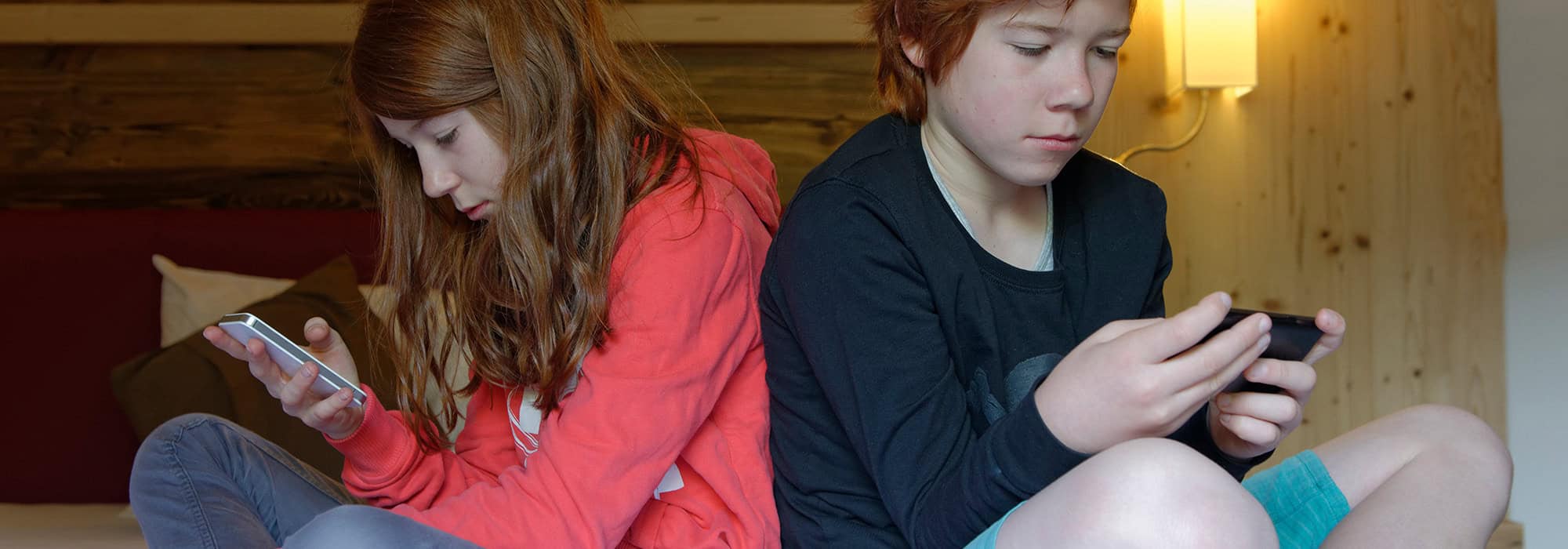Social Media Addiction Lawsuit | Social Media Addiction Lawyers
We Won’t Let Social Media Platforms Profit Off Your Harm
Social media is designed to be addictive and proven to damage mental health. Our social media addiction lawsuit attorneys will hold negligent social media companies accountable.
The devastating impact of social media addiction runs deeper than we ever thought possible. Social media addiction is a severe issue, hurting an increasing number of people not only in our community but around the globe. In extreme cases, addiction to social networking platforms can cause serious mental health issues, with users experiencing heightened levels of stress, anxiety, and even thoughts of self-harm or suicide.
Unfortunately, many of these victims of social media addiction are children, adolescents, and young adults who are more impressionable and easily manipulated by what they see online with widely unregulated access. Despite being aware of these risks, platforms like Meta, Snapchat, and TikTok continue to prioritize user engagement and profit over the well-being of their most vulnerable users, damaging their self-image and perception of reality and driving them to engage in dangerous behaviors that could cost them their lives.
At Grimes Teich Anderson, we understand the urgency of addressing this pressing issue, as it could save young lives. Our team of compassionate social media addiction attorneys is here to support you and your family every step of the way as we hold these social media sites accountable for negligence.
Your family does not have to suffer in silence. Contact us today to speak with a knowledgeable social media addiction attorney who cares about your recovery and safety.
Helping Those Hurt and Harmed Due to Negligence Since 1979
At Grimes Teich Anderson, our lawyers know how detrimental social media addiction can be to an individual’s mental health, and we are ready to take action to ensure that victims and their families receive the answers and justice that they deserve. For over four decades, we have protected and defended the rights of individuals hurt or harmed through no fault of their own across The Carolinas.
Our commitment to helping our clients extends beyond the courtroom. We provide resources, guidance, and ongoing support to help you navigate your recovery and rebuild a fulfilling life. If you or someone you care about is struggling with social media addiction, don't hesitate to reach out to us. However, time is of the essence, and you must act quickly to secure the compensation you may be entitled to. Contact us today for a free, no-obligation legal consultation.
Ex-Meta Employees Provide Testimony of Social Media's Harmful Effects on Users
Many view social media as a way to stay connected, but there is much more than meets the eye. According to Meta whistleblower Frances Haugen's testimony, it is a global threat engineered to cause severe harm to its users. Haugen stated that Facebook favors its own profits over the mental health and safety of its users and deliberately amplifies division, polarization, and extremism in favor of the $1 trillion corporation, altering billions of people’s perception of reality by showing them content with catastrophic consequences on our innermost thoughts, feelings, and behaviors.
Former Meta engineer Arturo Bejar testified to the Senate Judiciary Subcommittee on Privacy, Technology, and the Law, calling on the social networking company to prioritize safety for its users — particularly its younger audience. According to Bejar, 51% of users reported negative experiences every week in October 2021, with only 1% reporting offensive content and 2% succeeding in getting the content taken down. In addition, he noted that children aged 13-15 experienced abuse online, with 21.8% of users in the age group reporting abuse and bullying online every week. 39.4% of them reported negative comparisons, and 24.4% received unwanted advances, painting a sinister picture of the social media landscape for the young, impressionable, and most vulnerable population. Regrettably, these instances of abuse were not adequately addressed, and Meta still perpetuates this harmful culture for youth to this day. With his extensive experience in online safety, he demanded that Meta change how they identify and address bullying, abuse, unwarranted contact, and other misconduct.
The Devastating Impact of Social Media on Mental Health
Social media addiction occurs when excessive social media use and dependence cause problems in your personal life, and it can manifest in harmful thoughts, feelings, and behaviors. Addictive use of social media is linked to mental health issues like anxiety and depression. If you think you might have a social media addiction, there are options for professional help and steps you can take on your own to cut back.
Recognizing the signs of social media addiction is crucial for initiating the journey towards recovery. It's essential to acknowledge when social media use transitions from a leisure activity to a problematic behavior that impairs one's ability to lead a fulfilling life.
Seeking professional help is one solution for addressing an addiction to social media. Therapists and counselors trained in addiction psychology can provide tailored interventions to help individuals understand the root causes of their addictions and develop healthier coping strategies.
Additionally, individuals can take steps independently to mitigate the impact of social media addiction. This might involve setting strict boundaries around usage, such as limiting screen time or designating specific "social media-free" periods throughout the day. Engaging in alternative activities that promote offline connections and personal growth, such as hobbies, exercise, or mindfulness practices, can also help reduce reliance on social media as a primary source of fulfillment and prevent the progression of social media addictions.
Ultimately, overcoming social media addiction requires a combination of self-awareness, commitment to change, and access to supportive resources. By proactively addressing problematic usage patterns, individuals can regain control over their digital habits and prioritize their mental health and overall well-being.
Contact Us Today
Signs of Social Media Addiction
Identifying if you're struggling with social media addiction is crucial for taking proactive steps towards recovery. Here are some expanded signs to help you recognize if you're grappling with this issue:
- Excessive time investment. Much of your day is consumed by scrolling through social media sites, responding to notifications, or engaging in online interactions. This time spent on social media can often exceed what is considered reasonable or balanced, leading to neglect of other responsibilities and activities.
- Persistent thoughts about social media. Even when you're not using social media, thoughts about your online presence, upcoming posts, or interactions on these platforms persistently occupy your mind. This preoccupation with social media sites can intrude into your daily thoughts and distract you from other tasks or activities, compromising your mental health and everyday routines.
- Loss of interest in non-social media activities. Activities or hobbies that once brought you joy and fulfillment may now take a backseat to your social media usage. You may find yourself increasingly disinterested in pursuing other interests or hobbies as social media becomes the primary focus of your attention and energy.
- Social withdrawal. Spending excessive amounts of time on social media can lead to a gradual withdrawal from real-life social interactions and relationships. You may prefer the virtual connections offered by social media platforms over face-to-face interactions with friends, family, or colleagues, resulting in feelings of isolation and loneliness.
- Interference in work, school, and relationships. Social media addiction can have detrimental effects on various areas of your life, including work, academics, and personal relationships. You may need help concentrating on tasks or responsibilities, prioritizing social media use over important commitments, or experiencing conflicts with loved ones due to excessive screen time.
- Emotional dependence. Your emotional health and well-being become increasingly dependent on your social media activity, with fluctuations in mood based on online interactions and feedback. The absence of likes, comments, or validation on social media posts may trigger feelings of anxiety, inadequacy, or frustration, highlighting a reliance on these addictive platforms for emotional fulfillment.
- Using social media as a coping mechanism. Instead of directly addressing underlying emotions or stressors, you may turn to social media as a means of escape or distraction. Scrolling through feeds, seeking validation from online interactions, or numbing unpleasant emotions through excessive screen time can serve as temporary coping mechanisms, albeit with detrimental long-term consequences.
Recognizing these signs is the first step towards regaining control over your addiction to social media and reclaiming balance in your life. By acknowledging the impact of excessive social media use and taking proactive measures to establish healthier habits, you can cultivate a more fulfilling and mindful relationship with social media platforms and improve mental health.

Who is Eligible to File a Social Media Addiction Claim?
While the negative impact of social media can affect anyone, not everyone meets the criteria to pursue legal action in this regard. You may have grounds to file a lawsuit for social media addiction if:
- You or your child have become addicted to popular social media platforms such as Facebook, Instagram, TikTok, or Snapchat.
- You or your child have suffered physical or mental harm directly attributable to the addiction, affecting your overall well-being and quality of life.
- The onset of addiction occurred when you or your child were under the age of 25, recognizing the heightened vulnerability of younger demographics to the addictive nature of social media.
If you believe you meet these criteria or have been adversely affected by addiction to a social media platform, we encourage you to contact us for a complimentary consultation. During this consultation, we will assess your situation, discuss the specific criteria for filing a case, and clarify the legal options available to you and your family.
Know Your Rights as a Victim of Social Media Addiction
As someone addicted to social media to the point where it has negatively impacted your mental health, you have certain rights and avenues for recourse:
- Right to Seek Help: You have the right to seek professional help and support to address your addiction to social media and its consequences. This may include therapy, counseling, or participation in support groups tailored explicitly to individuals struggling with social media addiction.
- Right to Limitation of Harm: Social media platforms are responsible for implementing measures to mitigate the harmful effects of addictions on their users. This may include providing tools for users to manage their screen time, offering resources for addiction recovery, or implementing features to promote digital well-being.
- Right to Access Information: You can access accurate information about the potential risks and consequences of social media addiction. This may include educational resources, research studies, or informational materials provided by mental health professionals and advocacy organizations.
- Right to Advocate for Change: As someone impacted by social media addiction, you have the right to advocate for changes in policies and practices that contribute to addiction and its negative impacts. This may involve raising awareness, supporting legislative initiatives, or participating in grassroots movements to promote digital well-being.
- Right to Legal Recourse: In cases where social media addiction has resulted in significant harm or loss, you may have the right to pursue legal action against responsible parties. This could include claims related to privacy violations, negligence, or other legal theories, depending on the specific circumstances of your case.
It's essential to consult with legal professionals and mental health experts to understand your rights and explore the most appropriate solutions for addressing the impacts of social media addiction on your life.

Understanding Addiction
Addiction involves a complex pattern of behaviors characterized by the compulsive pursuit of a substance or activity despite negative consequences on mental and physical health. It typically contains three key components:
- Compulsion. The individual feels a strong urge or compulsion to engage in the addictive behavior, often driven by cravings or triggers.
- Loss of control. Despite attempts to cut back or stop, the individual struggles to control their behavior, continuing to engage in it even when aware of its harmful effects.
- Negative consequences. Addiction often leads to adverse consequences in various areas of life, such as health, relationships, work, or finances. Despite these consequences, the individual persists in their addictive behavior.
Additionally, addiction often involves changes in the brain's reward system, leading to tolerance (needing more of the substance or activity to achieve the same effect) and withdrawal symptoms when the behavior is discontinued. Overall, addiction is a complex and chronic condition that requires comprehensive treatment and support for recovery.
Addressing social media addiction requires a proactive and multi-faceted approach. Firstly, acknowledging the problem and accepting the need for change for your health and well-being is crucial. Setting clear, achievable goals for reducing social media use can provide a roadmap for progress. Establishing boundaries, such as designated times for social media usage and periods of abstention, helps create structure and discipline. Removing social media apps from devices or using blockers can limit access and reduce temptation. Additionally, finding alternative activities to engage in, such as hobbies or spending time with loved ones, helps fill the void left by reduced social media use.
Seeking support from friends, family, or support groups provides encouragement and accountability throughout the recovery journey. Mindfulness helps individuals stay aware of their social media usage habits and identify triggers. Professional help from therapists, counselors, or other mental health professionals specializing in digital addiction can offer personalized strategies and support. Tracking progress and celebrating successes, no matter how small, reinforces positive changes and encourages perseverance. Remembering that recovery from social media dependence takes time and effort, patience, and persistence are essential for long-term success in overcoming social media addiction and fostering a healthier, more balanced life.
Contact Us Today
It’s Time to Hold Social Media Companies Accountable
At Grimes Teich Anderson, we are committed to ensuring that addictive social networking platforms cannot continue to profit from the harm caused to individuals and their mental health. It's unacceptable for these platforms to prioritize engagement and profits over the well-being of their addicted users. Our firm firmly believes in holding social media giants accountable for the damage they inflict on individuals and families.
Our dedicated team is here to fight for justice and ensure that those harmed by social media addiction receive the compensation and support they deserve. By taking legal action, we aim to send a clear message to these platforms that their actions have consequences and that they must prioritize the safety and well-being of their users above all else.
Contact us today by submitting a form online or calling our office at 800-533-6845 for a free legal consultation.

